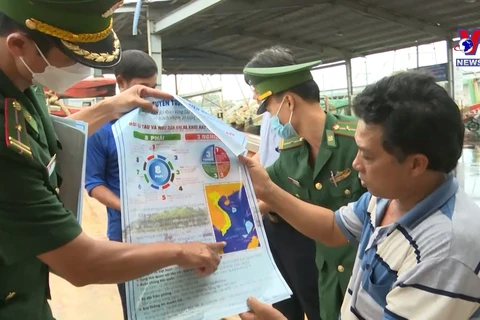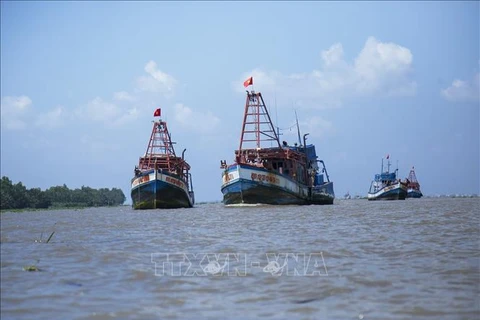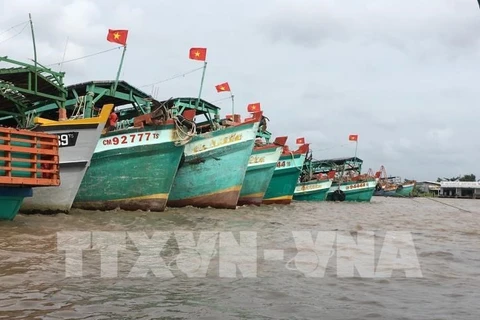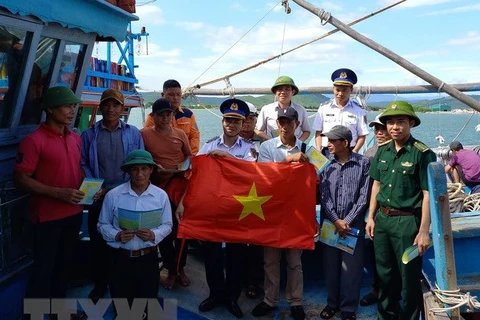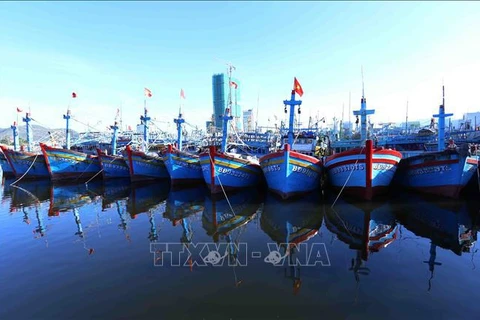Khanh Hoa (VNA) – Thanks to fishermen’s improved awareness and the entire political system’s strong engagement, the central province of Khanh Hoa has received high evaluation from the European Commission (EC) delegation for its progress in fighting illegal, unreported, and unregulated (IUU) fishing.
At a recent teleconference with the 28 coastal provinces and cities, Prime Minister Pham Minh Chinh said localities have 180 days to take actions to address problems and carry out the tasks they haven’t fulfilled to remove the EC’s “yellow card” warning against IUU fishing.
He emphasised that the combat against IUU fishing requires the entire political system’s engagement, and all efforts must be made for the sake of the people and the country.
Over the past five years, Khanh Hoa has stepped up the dissemination of regulations on anti-IUU fishing among the vessel owners, fishermen, captains, and fishery logistics service providers in coastal communes and fishery ports. Communications work has also been increased to raise fishermen’s awareness of the maritime boundaries of Vietnam and other countries so that they will not infringe in foreign waters. As a result, local fishermen’s awareness and adherence to laws have gradually been improved.
Nguyen Trong Hieu, head of the Hon Ro Port management board in Nha Trang city, said the EC delegation’s inspection showed that the port has met requirements for origin traceability and vessel records. Communications about IUU fishing prevention and control have also generated encouraging results, including a decline in the number of vessels and fishermen suspected of committing IUU fishing.
Fisherman Cao Van Tho, 53, from Vinh Truong ward of Nha Trang city, said to help persuade the EC to remove the “yellow card” warning, he and many other colleagues have exploited maritime resources only in the waters of Vietnam since they are well aware that if they violate foreign sea areas, the EC will not lift the “yellow card” warning and even impose a “red card”, which will greatly impact the country’s fisheries sector and fishermen’s income.
They have also complied with relevant rules when working at sea, including installing vessel monitoring systems, making reports whenever leaving or arriving at fishery ports, keeping full fishing records, and not infringing in other countries’ territories.
Nguyen Trong Chanh, Director of Khanh Hoa’s Sub-department for Fisheries, said since 2018, the province has issued 245 documents directing relevant units to take anti-IUU fishing measures.
It has also updated information about all the 3,199 local fishing vessels on the national fisheries database system (Vnfishbase), and granted fishing licences to 3,184 of them, equivalent to 99.5%. Up to 98.39% of the boats with a minimum length of 15 metres have been equipped with vessel monitoring devices.
He noted the vessel monitoring centre of the Fisheries Sub-department has applied modern equipment, assigned personnel to work around the clock, and kept in touch with families of vessel owners and fishermen in order to monitor the vehicles operating at sea and give timely warnings to those working in the waters adjacent to regional countries’.
“We adamantly do not permit vessels to leave ports if they haven’t fully complied with anti-IUU fishing rules,” Chanh went on.
In addition, the provincial Department of Agriculture and Rural Development also demanded the Fisheries Sub-departments coordinate with the border guards and localities to frequently hold patrols and examinations, and stringently deal with any violation of anti-IUU fishing rules.
Chanh noted Khanh Hoa hasn’t recorded any local fishing vessels violating foreign waters since 2018.
Support from fishermen is of great importance to the combat against IUU fishing, he opined, adding the upgrade of fisheries infrastructure is also critical to keeping control over vessels’ activities.
However, the provincial Department of Agriculture and Rural Development admitted that Khanh Hoa is still facing certain difficulties in this regard. The waters adjacent to those of some regional countries like Indonesia, Malaysia, Brunei, and the Philippines haven’t been demarcated, so vessels face latent risks while operating in these areas.
At a meeting in early December, the Khanh Hoa People’s Committee proposed ministries and central agencies step up negotiations on the maritime boundary delimitation between Vietnam and related countries to better manage fishing activities, minimise infringements of foreign waters, and provide timely assistance to vessels in distress at sea.
Khanh Hoa is currently home to four fishery ports, namely Hon Ro, Da Bac, Vinh Luong, and Dai Lanh, and 57 qualified establishments producing and processing fishery products for export recognised by the Ministry of Agriculture and Rural Development.
The province’s annual seafood catch averages 96,000 tonnes. In 2022, the figure is estimated at 97,800 tonnes, up 1.02% from a year earlier. Local aquatic products have been exported to 64 markets around the world./.
At a recent teleconference with the 28 coastal provinces and cities, Prime Minister Pham Minh Chinh said localities have 180 days to take actions to address problems and carry out the tasks they haven’t fulfilled to remove the EC’s “yellow card” warning against IUU fishing.
He emphasised that the combat against IUU fishing requires the entire political system’s engagement, and all efforts must be made for the sake of the people and the country.
Over the past five years, Khanh Hoa has stepped up the dissemination of regulations on anti-IUU fishing among the vessel owners, fishermen, captains, and fishery logistics service providers in coastal communes and fishery ports. Communications work has also been increased to raise fishermen’s awareness of the maritime boundaries of Vietnam and other countries so that they will not infringe in foreign waters. As a result, local fishermen’s awareness and adherence to laws have gradually been improved.
Nguyen Trong Hieu, head of the Hon Ro Port management board in Nha Trang city, said the EC delegation’s inspection showed that the port has met requirements for origin traceability and vessel records. Communications about IUU fishing prevention and control have also generated encouraging results, including a decline in the number of vessels and fishermen suspected of committing IUU fishing.
Fisherman Cao Van Tho, 53, from Vinh Truong ward of Nha Trang city, said to help persuade the EC to remove the “yellow card” warning, he and many other colleagues have exploited maritime resources only in the waters of Vietnam since they are well aware that if they violate foreign sea areas, the EC will not lift the “yellow card” warning and even impose a “red card”, which will greatly impact the country’s fisheries sector and fishermen’s income.
They have also complied with relevant rules when working at sea, including installing vessel monitoring systems, making reports whenever leaving or arriving at fishery ports, keeping full fishing records, and not infringing in other countries’ territories.
Nguyen Trong Chanh, Director of Khanh Hoa’s Sub-department for Fisheries, said since 2018, the province has issued 245 documents directing relevant units to take anti-IUU fishing measures.
It has also updated information about all the 3,199 local fishing vessels on the national fisheries database system (Vnfishbase), and granted fishing licences to 3,184 of them, equivalent to 99.5%. Up to 98.39% of the boats with a minimum length of 15 metres have been equipped with vessel monitoring devices.
He noted the vessel monitoring centre of the Fisheries Sub-department has applied modern equipment, assigned personnel to work around the clock, and kept in touch with families of vessel owners and fishermen in order to monitor the vehicles operating at sea and give timely warnings to those working in the waters adjacent to regional countries’.
“We adamantly do not permit vessels to leave ports if they haven’t fully complied with anti-IUU fishing rules,” Chanh went on.
In addition, the provincial Department of Agriculture and Rural Development also demanded the Fisheries Sub-departments coordinate with the border guards and localities to frequently hold patrols and examinations, and stringently deal with any violation of anti-IUU fishing rules.
Chanh noted Khanh Hoa hasn’t recorded any local fishing vessels violating foreign waters since 2018.
Support from fishermen is of great importance to the combat against IUU fishing, he opined, adding the upgrade of fisheries infrastructure is also critical to keeping control over vessels’ activities.
However, the provincial Department of Agriculture and Rural Development admitted that Khanh Hoa is still facing certain difficulties in this regard. The waters adjacent to those of some regional countries like Indonesia, Malaysia, Brunei, and the Philippines haven’t been demarcated, so vessels face latent risks while operating in these areas.
At a meeting in early December, the Khanh Hoa People’s Committee proposed ministries and central agencies step up negotiations on the maritime boundary delimitation between Vietnam and related countries to better manage fishing activities, minimise infringements of foreign waters, and provide timely assistance to vessels in distress at sea.
Khanh Hoa is currently home to four fishery ports, namely Hon Ro, Da Bac, Vinh Luong, and Dai Lanh, and 57 qualified establishments producing and processing fishery products for export recognised by the Ministry of Agriculture and Rural Development.
The province’s annual seafood catch averages 96,000 tonnes. In 2022, the figure is estimated at 97,800 tonnes, up 1.02% from a year earlier. Local aquatic products have been exported to 64 markets around the world./.
VNA


